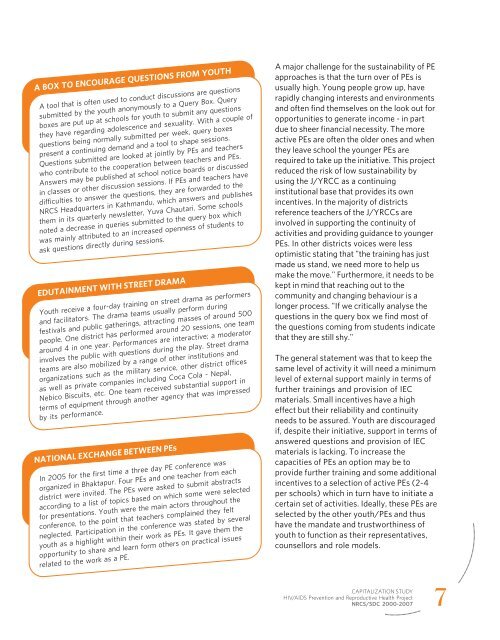HIV/AIDS Prevention & Reproductive Health Project
HIV/AIDS Prevention & Reproductive Health Project
HIV/AIDS Prevention & Reproductive Health Project
You also want an ePaper? Increase the reach of your titles
YUMPU automatically turns print PDFs into web optimized ePapers that Google loves.
A BOX TO ENCOURAGE QUESTIONS FROM YOUTH<br />
A tool that is often used to conduct discussions are questions<br />
submitted by the youth anonymously to a Query Box. Query<br />
boxes are put up at schools for youth to submit any questions<br />
they have regarding adolescence and sexuality. With a couple of<br />
questions being normally submitted per week, query boxes<br />
present a continuing demand and a tool to shape sessions.<br />
Questions submitted are looked at jointly by PEs and teachers<br />
who contribute to the cooperation between teachers and PEs.<br />
Answers may be published at school notice boards or discussed<br />
in classes or other discussion sessions. If PEs and teachers have<br />
difficulties to answer the questions, they are forwarded to the<br />
NRCS Headquarters in Kathmandu, which answers and publishes<br />
them in its quarterly newsletter, Yuva Chautari. Some schools<br />
noted a decrease in queries submitted to the query box which<br />
was mainly attributed to an increased openness of students to<br />
ask questions directly during sessions.<br />
EDUTAINMENT WITH STREET DRAMA<br />
Youth receive a four-day training on street drama as performers<br />
and facilitators. The drama teams usually perform during<br />
festivals and public gatherings, attracting masses of around 500<br />
people. One district has performed around 20 sessions, one team<br />
around 4 in one year. Performances are interactive; a moderator<br />
involves the public with questions during the play. Street drama<br />
teams are also mobilized by a range of other institutions and<br />
organizations such as the military service, other district offices<br />
as well as private companies including Coca Cola - Nepal,<br />
Nebico Biscuits, etc. One team received substantial support in<br />
terms of equipment through another agency that was impressed<br />
by its performance.<br />
NATIONAL EXCHANGE BETWEEN PEs<br />
In 2005 for the first time a three day PE conference was<br />
organized in Bhaktapur. Four PEs and one teacher from each<br />
district were invited. The PEs were asked to submit abstracts<br />
according to a list of topics based on which some were selected<br />
for presentations. Youth were the main actors throughout the<br />
conference, to the point that teachers complained they felt<br />
neglected. Participation in the conference was stated by several<br />
youth as a highlight within their work as PEs. It gave them the<br />
opportunity to share and learn form others on practical issues<br />
related to the work as a PE.<br />
A major challenge for the sustainability of PE<br />
approaches is that the turn over of PEs is<br />
usually high. Young people grow up, have<br />
rapidly changing interests and environments<br />
and often find themselves on the look out for<br />
opportunities to generate income - in part<br />
due to sheer financial necessity. The more<br />
active PEs are often the older ones and when<br />
they leave school the younger PEs are<br />
required to take up the initiative. This project<br />
reduced the risk of low sustainability by<br />
using the J/YRCC as a continuing<br />
institutional base that provides its own<br />
incentives. In the majority of districts<br />
reference teachers of the J/YRCCs are<br />
involved in supporting the continuity of<br />
activities and providing guidance to younger<br />
PEs. In other districts voices were less<br />
optimistic stating that "the training has just<br />
made us stand, we need more to help us<br />
make the move." Furthermore, it needs to be<br />
kept in mind that reaching out to the<br />
community and changing behaviour is a<br />
longer process. "If we critically analyse the<br />
questions in the query box we find most of<br />
the questions coming from students indicate<br />
that they are still shy."<br />
The general statement was that to keep the<br />
same level of activity it will need a minimum<br />
level of external support mainly in terms of<br />
further trainings and provision of IEC<br />
materials. Small incentives have a high<br />
effect but their reliability and continuity<br />
needs to be assured. Youth are discouraged<br />
if, despite their initiative, support in terms of<br />
answered questions and provision of IEC<br />
materials is lacking. To increase the<br />
capacities of PEs an option may be to<br />
provide further training and some additional<br />
incentives to a selection of active PEs (2-4<br />
per schools) which in turn have to initiate a<br />
certain set of activities. Ideally, these PEs are<br />
selected by the other youth/PEs and thus<br />
have the mandate and trustworthiness of<br />
youth to function as their representatives,<br />
counsellors and role models.<br />
CAPITALIZATION STUDY<br />
<strong>HIV</strong>/<strong>AIDS</strong> <strong>Prevention</strong> and <strong>Reproductive</strong> <strong>Health</strong> <strong>Project</strong><br />
NRCS/SDC 2000-2007<br />
7

















